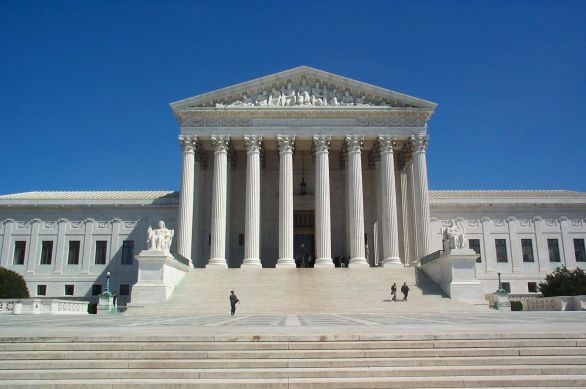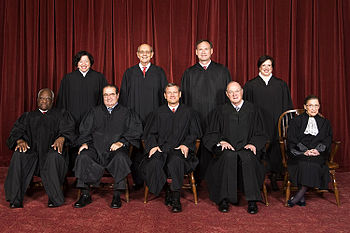Yeah... probably not.
But something interesting did happen: the nation's whole commetariat became obsessed with a case that's not (primarily) about abortion. We usually reserve the attention we gave the Court last week for Roe type cases, not cases that begin with two hours of hearings about the Anti-Injuction Act of 1875. The media firestorm came with its own curiosity: with all the talk about the length of the hearings and the quick turnaround of the audio tapes, no one - or at least almost no one on TV, in print, or on the internet - asked "why not live audio?" or "why not video?"
I talked about this with a few folks, but only in passing. One friend's students expressed a worry that it would make the Supreme Court too much like this:

Now, I think there'a lot more than video standing between Judge Judy and the Supreme Court of the United States. For one, Judge Judy isn't a judge. She was (in New York State Criminal Courts from 1982-1996), but she isn't anymore; her decisions on TV are only enforceable because the "litigants" sign binding arbitration agreements. She's an arbitrator, but I have to acknowledge that "Arbitrator Judy" doesn't have nearly the same ring to it.
But it does make me wonder why we think putting the Supreme Court on TV would somehow cheapen it. We have televised looks into the other branches: Presidential addresses, news coverage, C-SPAN generally. What makes the Court special?
I think it's because we want to pretend that the boundary between law and politics is starker and better defended that it actually is. In order to see the Supreme Court, you literally have to ascend to upon high. You must climb the high marble steps, walk between those impressive pillars. The building is constructed as a temple of justice.

So, to, are the Capitol building and the White House, but we don't actually have to ascend to witness the goings on. They can be brought into our homes, our living rooms, and maybe this makes them seem more mundane. If we could watch Scalia read an opinion from the bench, maybe it would lose whatever mysticism seems to attach to it. Opinions are "handed down," taking on a air of decrees from on high. I think maybe humanizing the Court would rob it of its majesty.
This let's us keep thinking that law isn't simply politics continued by other means. Don't get me wrong, I think there is some content to law that isn't simply captured by politics. But ironically, this is less true at the Supreme Court than almost anywhere else. Cases make it there because they don't have clear legal answers, because they contain questions on which reasonable people can disagree and for which there is no clear "right" answer. If there were, it would have been dispensed with at a lower court and its appeals rejected. Politics plays a bigger role in SCOTUS decisions than almost anywhere else in the law. This troubles us, I think, and treating it differently than other branches let's us pretend it's less true.
For similar reasons, we don't want to worry that the judges worry about their perception, how they sound on tape, how they look on camera, whether they look tiny in a big wooden chair, etc.

Whether we really believe it or not, some part of us seems comforted by the idea that nine wise persons sit in high-minded judgment, unimpeded by thoughts of anything other than their love and knowledge of the law.
I mean, that's a load, but I understand why we feel comforted by it. We don't want our Justices to resemble this guy:

So, for the first time since I started writing on this page, let me ask you: why does increasing access to the Supreme Court feel wrong, or cheap? Or am I wrong in thinking that they are? I'm really curious to hear what you think: do we lionize the Court more than we should, or are their good reasons for the reverence these practices are designed to inculcate?
Televising the court - or doing anything to expose it more to the public - would make the politics involved more populist. I think that is upsetting to elites, and not without reason. We already have populism (writ large... not, you know, adding silver not the gold standard) in other branches of government. Combine that with the desire for hard and fast truths, and the belief that somehow the Constitution can provide them, and it is easy to understand why political and legal elites would like to shield the Court from the public eye.
ReplyDelete